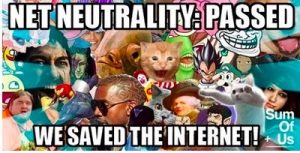
Here is the opinion of Mary Robinson, formerly UN High Commissioner for Human Rights:
“Having been UN High Commissioner for Human Rights, I am all too familiar with the argument that human rights is a ‘Western’ concept. The uprisings that began to shake the Arab world almost two years ago, and the developments that have followed, are one great example of the fundamental flaw in this argument. In Egypt, Tunisia and elsewhere we saw an unprecedented expression of the universal desire – long-repressed – for dignity and freedom. . .
“Unfortunately, the same tools and platforms that have helped these freedoms to flourish can be manipulated to restrict access to information, monitor dissident activity and exercise greater control over citizens. They offer perhaps as many challenges to these freedoms as they do opportunities. Just two weeks ago we saw Syria’s government cutting off internet and mobile access to the entire country, just as Egypt’s government did in January 2011. Others are using international fora to lobby for greater powers for governments seeking to restrict citizens’ internet freedoms in the name of ‘security’.
“The internet has given rise to a new space and new tools for human activity, but it does not require a new set of rules. The internationally agreed rights to freedom of opinion and expression, to peaceful assembly and association, and to take part in government are enshrined in the very document that we have celebrated on this day for the past 64 years. These covenants should be applied to the online world in exactly the same way that they apply to the ‘offline’ world. . . .
The slogan for this year’s Human Rights Day is ‘My Voice Counts’. In Egypt, we saw just how fervently people believe this to be true – each of us, whether we live under democracy or dictatorship, yearns to have some say in the decisions that affect our lives. The internet has provided us with new tools that strengthen citizen movements and promote greater democratisation and accountability; it has also proved a powerful tool for censorship and surveillance.
Only by protecting the internet as a space where respect for fundamental human rights prevails can we hope to see more Springs, more Awakenings and ever greater freedoms in years to come.
Australian MPs react to Julian Assange’s release
Amnesty International: Julian Assange’s five-year imprisonment in the UK is unacceptable
United Nations: CSW67 Opening statement: Digital rights are women’s rights
Coronavirus reveals need to bridge the digital divide
GAPMIL gives Global Media and Information Literacy Awards 2018
U.N. passes landmark resolution condemning internet shutdowns
NetGain: Let’s Work Together to Improve the Internet
USA: rock solid rules to ensure the Internet stays open and free
United States: News and Press Freedom Organizations Stand Up for Real Net Neutrality
Brasil: Marco Civil da Internet começa a valer em junho
Brazil: Internet “bill of rights” to take effect in June